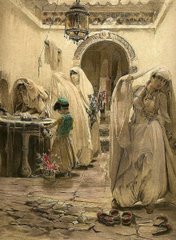Food for thought!
Imagery in Islam
BY AMIR TAHERI
There is no Quranic injunction against images, whether of Muhammad or anyone else. When it spread into the Levant, Islam came into contact with a version of Christianity that was militantly iconoclastic. As a result some Muslim theologians, at a time when Islam still had an organic theology, issued "fatwas" against any depiction of the Godhead. That position was further buttressed by the fact that Islam acknowledges the Jewish Ten Commandments--which include a ban on depicting God--as part of its heritage. The issue has never been decided one way or another, and the claim that a ban on images is "an absolute principle of Islam" is purely political. Islam has only one absolute principle: the Oneness of God. Trying to invent other absolutes is, from the point of view of Islamic theology, nothing but sherk, i.e., the bestowal on the Many of the attributes of the One.
The claim that the ban on depicting Muhammad and other prophets is an absolute principle of Islam is also refuted by history. Many portraits of Muhammad have been drawn by Muslim artists, often commissioned by Muslim rulers. There is no space here to provide an exhaustive list, but these are some of the most famous:
A miniature by Sultan Muhammad-Nur Bokharai, showing Muhammad riding Buraq, a horse with the face of a beautiful woman, on his way to Jerusalem for his M'eraj or nocturnal journey to Heavens (16th century); a painting showing Archangel Gabriel guiding Muhammad into Medina, the prophet's capital after he fled from Mecca (16th century); a portrait of Muhammad, his face covered with a mask, on a pulpit in Medina (16th century); an Isfahan miniature depicting the prophet with his favorite kitten, Hurairah (17th century); Kamaleddin Behzad's miniature showing Muhammad contemplating a rose produced by a drop of sweat that fell from his face (19th century); a painting, "Massacre of the Family of the Prophet," showing Muhammad watching as his grandson Hussain is put to death by the Umayyads in Karbala (19th century); a painting showing Muhammad and seven of his first followers (18th century); and Kamal ul-Mulk's portrait of Muhammad showing the prophet holding the Quran in one hand while with the index finger of the other hand he points to the Oneness of God (19th century).
Some of these can be seen in museums within the Muslim world, including the Topkapi in Istanbul, and in Bokhara and Samarkand, Uzbekistan, and Haroun-Walat, Iran (a suburb of Isfahan). Visitors to other museums, including some in Europe, would find miniatures and book illuminations depicting Muhammad, at times wearing his Meccan burqa (cover) or his Medinan niqab (mask). There have been few statues of Muhammad, although several Iranian and Arab contemporary sculptors have produced busts of the prophet. One statue of Muhammad can be seen at the building of the U.S. Supreme Court, where the prophet is honored as one of the great "lawgivers" of mankind.
There has been other imagery: the Janissaries--the elite of the Ottoman army--carried a medallion stamped with the prophet's head (sabz qaba). Their Persian Qizilbash rivals had their own icon, depicting the head of Ali, the prophet's son-in-law and the first Imam of Shiism. As for images of other prophets, they run into millions. Perhaps the most popular is Joseph, who is presented by the Quran as the most beautiful human being created by God.


